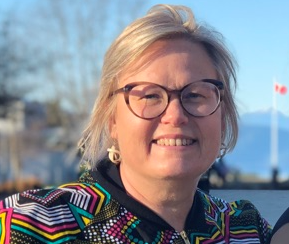
05 Jan Professor Eileen Moyer; at the intersection of Medical Anthropology & Climate change
In recent years, Eileen Moyer has been increasingly confronted with environmental issues in her research in urban Africa. Examples include flash flooding that makes it impossible to reach research sites, social unrest in urban areas where people are required to pay for scarce water, and pesticide pollution in the Kenyan flower industry. Following her ethnographic observations of everyday life, she turned her attention to study the role that climate change plays in health and disease ecologies. Having spent more than 25 years working on projects about HIV, health, and gender dynamics in urban African settings, a few years ago Eileen began using HIV as a lens to think about human-viral ecologies in relation to urbanization and biodiversity loss. She observed how the trade in wild animals, declining land availability for wildlife, and the intensification of agricultural practices has resulted in greater interactions between humans and animals to facilitate zoonosis, or the transmission of diseases from animal to human. Eileen argues that “a virus is a being that interacts with humans,” hence the term “human-viral ecology”.
Having devoted most of her professional career to conducting HIV research as a medical anthropologist while also teaching urban and medical anthropology at the University of Amsterdam (UvA), Eileen will soon dedicate her expertise to a new field. She was recently appointed to the role of Professor of Anthropology of Ecology, Health and Climate Change at the UvA. From January onwards, Eileen will dedicate most of her research and student supervision to projects related to climate change and develop new courses that focus on this topic. The new professorship is seen in the anthropology department as a necessary step to address increasing demands from students who wish to study the impacts of climate change on ecology, health and culture.
You may be wondering: how does a Medical Anthropologist become an Anthropologist of Ecology, Health and Climate Change and how are they related?
For Eileen, this critical gap was bridged through the research of feminist scholars, particularly Anna Tsing and Donna Haraway, who consider relationships between human action, ecology, and climate change. Following Tsing, Eileen has come to see the urban locations of her research as “disrupted ecologies where nature and culture are entangled in particular ways, where new social relations emerge not just among humans, but also between humans and microbes.”
“When we think of climate change, we think about changing weather patterns, drought, flooding and a warming planet. While these are urgent matters, especially in urban locations, changing biosphere conditions also dramatically effect microbial life, including the extent to which humans encounter potentially harmful bacteria and viruses.”
Eileen is also interested in how mitigating the impacts of climate change and restoring urban ecologies will shape social relations in the coming decades, particularly how humans understand the relationship between human and environmental well-being and how humans position themselves in relation to nature. She has recently submitted a proposal to the Dutch research council (NWO) to study urban regeneration efforts and climate change mitigation in South Africa.
Referring to the book, Slow Violence and the Environmentalism of the Poor, by Rob Nixon, Eileen explains the importance of considering a long-term time frame when examining how climate change shapes health and disease outcomes. According to her, a lot of public health research initiatives have tracked short term indicators that focus on a direct cause. To study the effects of either climate change or climate change mitigation interventions on health, short term indicators will not suffice. By positioning herself at the junction of public health, microbiology, urban studies, and environment health, she believes she can contribute to the development of long-term thinking in relation to climate change, however she insists that it is difficult to advance ideas without doing ethnographic fieldwork: “COVID-19 has kept me from traveling to my normal field sites, forcing me to work out my ideas from home, which is far from ideal. After all, I am an anthropologist and I need to get my hands dirty.” Eileen has relied on one of her favorite methodological approaches these last few months—that of ‘walking the city’—to consider the ways that urban life in Amsterdam changes due to the human encounter with COVID-19. She published an article on this in City and Society earlier this year and has recently presented a paper virtually at an international conference on COVID-19, Climate Change and the City. She has also been considering the ways that social science, specifically ethnographic practice, is changing because of COVID-19. She is particularly interested in novel forms of online research and the potential for new citizen science collaborations. She is a co-applicant on an NWO Zwaartekracht grant to be submitted in January that will, among other things, endeavor to promote public engagement in infectious disease responses through citizen science.
In the midst of the COVID-19 pandemic, institutional work has become more challenging. Setting up a new research area has not been easy, but Eileen says that working in the virtual world has also made some things easier. “Because people are more accessible online, setting up an international consortium requires less time and money, and we don’t need to fly around the world to do it! I am also learning new ways to collaborate with researchers from the communities where I’ve done research in the past”. We wish Eileen the best of luck with her new position and we are confident she is the perfect candidate to establish the necessary linkages between global health and climate change.
